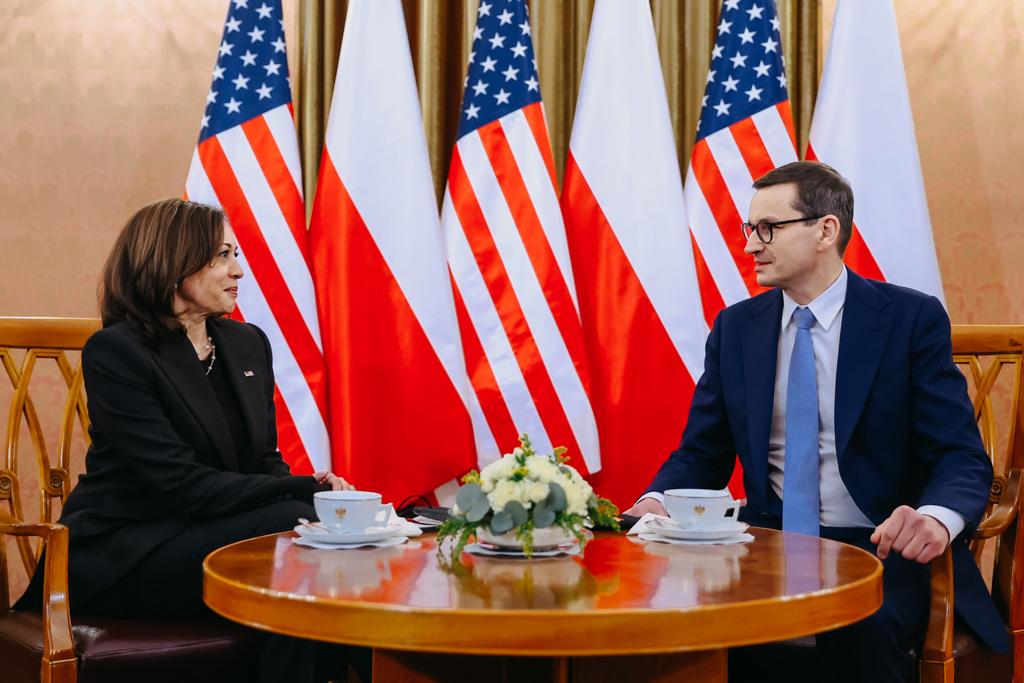During his upcoming visit to Washington the Prime Minister of Poland will talk with Vice-President Kamala Harris about the atom and the financing of megaprojects, as well as the efforts of the Polish presidency of the European Union to build a strategic partnership with the Americans.
Atomic game
„Our goal is to develop the Polish atom with the best American suppliers, this is about a strategic partnership between Poland and the US,” the Polish PM said when commenting on the construction of Poland’s first NPP in Pomerania with Bechtel and Westinghouse. The PM is about to visit the US this week. Morawiecki said he would talk with VP Kamala Harris about financing models for mega projects.
Morawiecki revealed that Poland and the United States agreed during President Joe Biden’s visit to Warsaw that the Polish presidency of the European Union in two years would aim to develop a strategic partnership with the Americans. It can also have an energy dimension.
Europe is already engaged with the US
A year ago, the United States and the European Union set up a joint US-EU Task Force On Energy Security appointed by President Biden and EC President Ursula von der Leyen. In a statement made on 3 April, the task force stated that significant progress had been achieved in decreasing EU dependency on Russian energy sources.
The Task Force has reported that the diversification of natural gas supplies and reduction of overall natural gas demand in line with the EU’s climate policy objectives had been achieved.
The US has more than doubled its LNG supplies to EU countries. In 2022, America exported 56 bcm of LNG, while in 2021 that amount reached 22 bcm. The EU was the largest destination for LNG exports from the US, accounting for more than 52 percent of all LNG imports to the bloc. At the end of 2022, Russian gas accounted for only 16 percent of gas imports to the EU.
Power consumption has fallen across the European Union. Improvements in energy efficiency in the residential sector are noticeable, and new digital solutions have been launched to help consumers lower energy bills. The introduction of other efficiency instruments on the energy demand side has proven effective.
The US-EU Task Force On Energy Security falls within the competence of the US-EU Energy Council, within the framework of the multiannual transatlantic cooperation program. It was established to support the implementation of the Paris Agreement. This means achieving net zero emissions by 2050 and maintaining a limited increase in global temperature to 1.5 degrees Celsius.
The Task Force is an important platform for the regular exchange of information between the United States and the European Commission. It monitors energy security in the EU and neighbouring countries and progress in reducing dependence on fossil fuels. It monitors the situation on global LNG markets, analyses market forecasts, regulatory environment, development of LNG export capacity in the US, strengthening of EU LNG infrastructure and the EU energy situation and joint gas purchases. In addition, the Task Force helped ensure adequate gas storage levels ahead of the 2022 winter season.
In 2023 the Task Force will continue to work in accordance with the arrangements made by EC President Ursula von der Leyen and President Joe Biden on 10 March 2023. The team’s priorities for 2023 include, firstly, a permanent assessment of the situation on global markets and ensuring LNG supplies from the US to Europe at a level of at least 50 billion cubic meters. Second, the reduction of methane emissions. Third, action on energy savings and energy efficiency.
The task force meetings will be chaired by Björn Seibert, head of the European Commission President’s office, and Amos Hochstein, White House Special Coordinator for Global Energy Infrastructure and Energy Security. The task force reports to President von der Leyen and President Biden. The meetings of the group are attended by high representatives of the US Department of State, the US Department of Energy, the Directorate-General for Energy of the European Commission and representatives of the European External Action Service.
US-EU strategic partnership would help Poland’s nuclear project
The US-EU Task Force will work before the next heating season, and the European-American cooperation can ensure not only additional gas that Poland has been importing from the Americans since 2018, but also the opportunity to develop nuclear energy. In this regard, Poland can use cooperation with the United States to block opposition to the atom from countries traditionally hostile to it: Austria, Germany or Luxembourg.
White House / Teresa Wójcik / Wojciech Jakóbik









